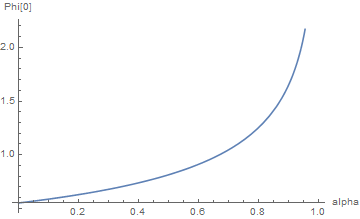The nonlinear problem in the question,
Eta = Phi[x] - a - b;
eqn = Phi''[x] == k*j0*(Exp[((1 - alpha) F Eta)/(R T)] - Exp[ (-alpha F Eta)/(R T)]);
soln = DSolve[{eqn, Phi'[0] == 0, Phi'[1] == 1}, Phi[x], x]
yields an empty solution set with the explanatory warning
DSolve::bvimp: General solution contains implicit solutions. In the boundary value problem, these solutions will be ignored, so some of the solutions will be lost.
DSolve, or more precisely Solve, which it calls, cannot invert the boundary conditions. Sometimes,
SetOptions[Solve, Method -> Reduce]
overcomes this difficulty, but not here. Instead, apply DSolve without boundary conditions, which yields,
s = soln = DSolve[eqn, Phi[x], x]
(* Solve[
Integrate[1/Sqrt[(2*E^((F*(a*(-1 + alpha) + (-1 + alpha)*b - alpha*K[1]))/(R*T))*
((-1 + alpha)*E^(((a + b)*F)/(R*T)) - alpha*E^((F*K[1])/(R*T)))*j0*k*R*T)/
((-1 + alpha)*alpha*F) + C[1]], {K[1], 1, Phi[x]}]^2 == (x + C[2])^2, Phi[x]] *)
That neither Solve nor Reduce can make headway with this equation is, perhaps, not surprising. Nonetheless, some progress can be made. First, extract the equation from within s and take the square root of both sides.
ss = s[[1]] /. Power[z_, 2] -> z
(* Integrate[1/Sqrt[(2*E^((F*(a*(-1 + alpha) + (-1 + alpha)*b - alpha*K[1]))/(R*T))*
((-1 + alpha)*E^(((a + b)*F)/(R*T)) - alpha*E^((F*K[1])/(R*T)))*j0*k*R*T)/
((-1 + alpha)*alpha*F) + C[1]], {K[1], 1, Phi[x]}] == x + C[2] *)
(Edit: The following was rewritten to properly address boundary conditions.)
The boundary conditions now can be applied to determine the constant C[1] as follows. To obtain Phi'[x], differentiate ss, multiply the resulting equation by the denominator of the left side of the equation, and square both sides.
sss = (Numerator[D[ss, x][[1]]])^2 == (Denominator[D[ss, x][[1]]])^2
(* Derivative[1][Phi][x]^2 ==
(2*E^((F*(a*(-1 + alpha) + (-1 + alpha)*b - alpha*Phi[x]))/(R*T))*
((-1 + alpha)*E^(((a + b)*F)/(R*T)) - alpha*E^((F*Phi[x])/(R*T)))*j0*k*R*T)/
((-1 + alpha)*alpha*F) + C[1 *)
Note that this result also can be obtained by multiplying eqn by Phi'[x] and integrating. Now C[1] can be computed trivially by
First@Solve[sss /. x -> 0 /. Phi'[0] -> 0, C[1]]
(* {C[1] -> (-2*E^((F*(a*(-1 + alpha) + (-1 + alpha)*b - alpha*Phi[0]))/(R*T))*
(-E^(((a + b)*F)/(R*T)) + alpha*E^(((a + b)*F)/(R*T)) - alpha*E^((F*Phi[0])/(R*T)))*j0*
k*R*T)/((-1 + alpha)*alpha*F)} *)
as well as from First@Solve[sss /. x -> 1 /. Phi'[1] -> 1, C[1]]. Consistency of these two results requires
1 == (sss[[2]] /. x -> 1) - (sss[[2]] /. x -> 0)
(* 1 == (-2*E^((F*(a*(-1 + alpha) + (-1 + alpha)*b - alpha*Phi[0]))/(R*T))*
((-1 + alpha)*E^(((a + b)*F)/(R*T)) - alpha*E^((F*Phi[0])/(R*T)))*j0*k*R*T)/
((-1 + alpha)*alpha*F) +
(2*E^((F*(a*(-1 + alpha) + (-1 + alpha)*b - alpha*Phi[1]))/(R*T))*
((-1 + alpha)*E^(((a + b)*F)/(R*T)) - alpha*E^((F*Phi[1])/(R*T)))*j0*k*R*T)/
((-1 + alpha)*alpha*F) *)
A solution to the nonlinear ODE eqn therefore exists only if this consistency condition can be satisfied. Adjusting C[2] may well be sufficient to satisfy the consistency condition, but determining the necessary value for C[2] appears to be a numerical calculation.
Addendum
A little more progress can be made for the special case, alpha == 1/2.
eqn = Phi''[x] == 2 k*j0*Sinh[Eta F/(2 R T)];
soln = Phi[x] /. DSolve[{eqn}, Phi[x], x] /.
JacobiAmplitude[z1_, z2_] :> JacobiAmplitude[Simplify[z1], z2]
(* {(a F + b F + 4 I R T JacobiAmplitude[(I Sqrt[F] Sqrt[8 j0 k R T + F C[1]] (x + C[2]))/
(4 R T), (16 j0 k R T)/(8 j0 k R T + F C[1])])/F,
{(a F + b F - 4 I R T JacobiAmplitude[(I Sqrt[F] Sqrt[8 j0 k R T + F C[1]] (x + C[2]))/
(4 R T), (16 j0 k R T)/(8 j0 k R T + F C[1])])/F} *)
Unfortunately, the resulting boundary conditions cannot be solved symbolically by Mathematica for the two constants of integration.
Solve[{0 == D[soln[[1]], x] /. x -> 0, 1 == D[soln[[1]], x] /. x -> 1}, {C[1], C[2]}]
returns unevaluated with the message
Solve::nsmet: This system cannot be solved with the methods available to Solve.
Reduce does no better.
Second Addendum
The OP indicates in a comment below that only Phi[0] is needed. I know of no way to obtain even that symbolically. However, it can be obtained numerically without difficulty. For instance, with a + b == 0, k j0 == 1, and F/(R T) == 1,
eqn = Phi''[x] == Exp[(1 - alpha) Phi[x]] - Exp[ -alpha Phi[x]];
ParametricNDSolveValue[{eqn, Phi'[0] == 0, Phi'[1] == 1}, Phi[0], x, {alpha}];
Plot[%[alpha], {alpha, 0, 1}, AxesLabel -> {alpha, "Phi[0]"}]



soln = DSolve[{eqn, Phi[0] == 0, Phi'[1] == 1}, Phi[x], x]also, you're missing a curly bracket beforePhi[x]inlinearisedBV$\endgroup$Phi'[0] == 0instead ofPhi[0] == 0. $\endgroup$